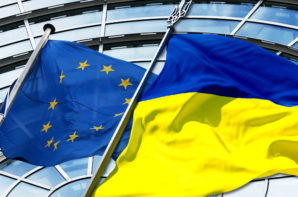

The Association agreement (AA) between the EU and Ukraine is an international treaty, which includes political provisions (non-binding in most cases) and trade provisions (the so-called “Deep and Comprehensive Free Trade Agreement”, or DCFTA). The DCFTA is Title IV, ie. one part of the Association Agreement. The EU has many different agreements with a large number of countries. Association Agreements like the one with Ukraine have also been assigned with Moldova and Georgia.
This Agreement has been negotiated with Ukraine in a fully transparent manner and is of course accessible publicly). The DCFTA, which is the core of the AA, provides for two kinds of commitments:
-
the EU and Ukraine commit to move progressively towards duty free trade (although duty free exports of some (37) agricultural products from Ukraine to the EU remain subject to tariff rate quotas). Such trade liberalisation is at the core of all the free trade agreements the EU has signed with dozens of countries all over the world, and is based on empirical evidence that opening up markets is a win-win process, leading to more trade, more jobs, and lower prices.
-
Ukraine commits to adopt a number of EU norms and standards on foods, industrial and consumer goods, as well as EU rules on services, competition, public procurement, intellectual property, and so on. The objective is to make trade between the EU and Ukraine easier, because tariffs are one thing, but trade can often be limited by so called “non-tariff barriers”. This implies no changes to EU regulations, only to the Ukrainian legislation. Ukraine will be obliged to adopt EU rules and standards.
The benefits for the EU are numerous: easier access for exporters (both because of duty free trade and adoption by Ukraine of EU norms and standards) to a neighbouring market of 45 million inhabitants, better protection of EU investments in Ukraine (through competition rules that Ukraine will adopt), of EU brands (through the intellectual property chapter of the agreement),etc. Moreover, as the Agreement promotes business-friendly reforms in Ukraine, it should help the Ukrainian economy to grow and increase its imports from the EU, to the benefit of the EU companies and workers.
This agreement is NOT about joining the EU: There is not a single provision in the AA that refers to EU membership, nor any commitment from the EU in that sense. Agreeing that a third country should even be a candidate for EU membership is a separate decision that must be taken unanimously by all EU Member states; so even if this question would be raised one day in the future, the Netherlands could veto it.
This agreement is NOT about providing massive financial support to Ukraine: the EU has been providing support to Ukraine for a long time as part of its cooperation and development aid, but this is not linked to the AA and there is no new commitment to more financial support from the EU to Ukraine in the AA.
This agreement is NOT about opening the EU to Ukrainian workers: there is no provision in the treaty giving enhanced freedom of movement to Ukrainian workers or citizens to or inside the EU. There is a parallel process of visa liberalization, which would allow Ukrainian citizens to access the EU without visas (for a limited period of time), but this is a different process, with no link with the AA.
This agreement is NOT about joining NATO. It goes without saying as the EU and NATO are very different organisations (simply because plenty of NATO members are not EU members and plenty of EU members are not NATO members). There is not a single provision in the AA about NATO membership.
